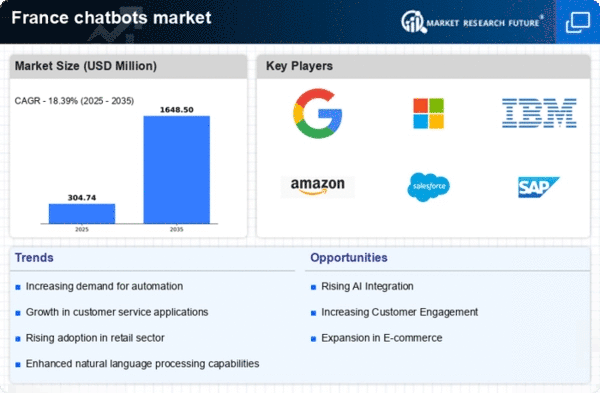Growing E-commerce Sector
The expansion of the e-commerce sector in France is a crucial driver for the chatbots market. As online shopping continues to gain traction, businesses are increasingly leveraging chatbots to enhance the customer experience. Chatbots can assist with product recommendations, order tracking, and customer inquiries, thereby streamlining the shopping process. Recent data indicates that e-commerce sales in France are projected to reach €130 billion by 2026, highlighting the potential for chatbots to play a pivotal role in this growth. As retailers seek to differentiate themselves in a competitive landscape, the integration of chatbots into e-commerce platforms is likely to become more prevalent, thereby fueling the growth of the chatbots market.
Technological Advancements in AI
The rapid evolution of artificial intelligence (AI) technologies is a primary driver for the chatbots market in France. Innovations in natural language processing (NLP) and machine learning algorithms enhance the capabilities of chatbots, allowing them to understand and respond to user queries more effectively. This technological progress is expected to lead to a projected growth rate of approximately 25% in the chatbots market by 2027. As businesses increasingly seek to automate customer interactions, the demand for sophisticated AI-driven chatbots is likely to rise. Furthermore, the integration of AI with other technologies, such as voice recognition and sentiment analysis, could further expand the functionalities of chatbots, making them indispensable tools in various sectors, including retail and finance.
Increased Focus on User Experience
The emphasis on improving user experience is a driving force behind the chatbots market in France. Companies are increasingly aware that a seamless and engaging customer interaction can significantly impact brand loyalty and retention. Chatbots are being utilized to provide personalized experiences, guiding users through their journeys and addressing their specific needs. This focus on user-centric design is expected to lead to a rise in chatbot adoption across various industries, including hospitality and healthcare. As businesses strive to create more intuitive and responsive customer interactions, the chatbots market is likely to witness substantial growth, with organizations investing in advanced chatbot solutions to enhance user satisfaction.
Cost Efficiency and Operational Savings
The pursuit of cost efficiency is a significant factor propelling the chatbots market in France. Businesses are increasingly recognizing the financial benefits of deploying chatbots, which can handle multiple customer interactions simultaneously without incurring additional labor costs. By automating routine inquiries, companies can allocate human resources to more complex tasks, thereby optimizing operational efficiency. Reports suggest that organizations can save up to 30% on customer service costs by integrating chatbots into their operations. This financial incentive is likely to encourage more businesses to invest in chatbot technology, further driving the expansion of the chatbots market as firms seek to enhance profitability while maintaining high service standards.
Rising Demand for 24/7 Customer Support
The increasing expectation for round-the-clock customer service is significantly influencing the chatbots market in France. Consumers now anticipate immediate responses to their inquiries, regardless of the time of day. This shift in consumer behavior is driving businesses to adopt chatbots as a solution to provide continuous support without the need for human intervention. According to recent studies, approximately 70% of consumers prefer interacting with chatbots for quick answers, which indicates a strong market potential. As companies strive to enhance customer satisfaction and loyalty, the implementation of chatbots is likely to become a standard practice, thereby propelling the growth of the chatbots market in the coming years.
















